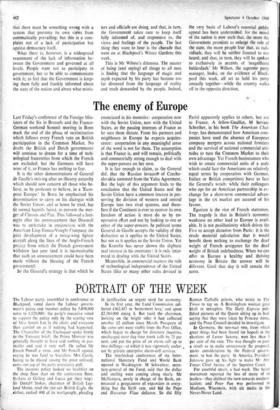The enemy of Europe
Last Friday's conference of the Foreign Min- isters of the Six in Brussels and the Franco- German weekend Summit meeting in Bonn mark the end of the phase of recrimination which follows every French veto on British participation in the Common Market. No doubt the British and Dutch governments will continue to dream for a time of tech- nological fraternities from which the French are excluded; but the Germans will have none of it, so France has nothing to fear.
It is the other demonstrations of General de Gaulle's striving after an illusory autarchy which should now concern all those who be- lieve, as he professes to believe, in a 'Euro- pean Europe.' In Bonn_he emphasised his determination to carry on his dialogue with the Soviet Union: and at home he tried, but (it seems) happily failed, to prevent the mer- ger of Citroen and Fiat. This followed a fort- night after the announcement that Dassault was to undertake in conjunction with the American Ling-Temco-Vought Company the joint de‘elopment of a swing-wing fighter aircraft along the lines of the Anglo-French project from which the French government withdrew last year (and it is inconceivable that such an announcement could have been made without the blessing of the French government).
So the General's strategy is that which he enunciated in his memoirs: cooperation now with the Soviet Union, now with the United States, as the passing interests of France as he sees them dictate. From his partners and neighbours in Europe he expects acquies- cence: cooperation in any meaningful sense of the word is not for them. The assumption is that France is, and will remain, politically and commercially strong enough to deal with the super-powers on her own.
It is fair enough to claim, as the General did, that the Russian, invasioft- of Czecho- slovakia stemmed from the Yalta Agreement. But the logic of this argument leads to the conclusion that the United States and the Soviet Union have a common interest in pre- serving the division of western =and central Europe into two rival systems, and there- fore if the Continent is ever to recover its own freedom of action it must do so by co- operative effort and not by looking to one or other of the super-powers. In political terms General de Gaulle accepts the validity of this deduction as it applies to the United States, but not as it applies to the Soviet Union. Yet the Kremlin has never shown the slighteSt real interest in his overtures: it is only inter- ested in dealing with the United States.
Meanwhile, in commercial matters the rule of technological independence of the United States (like so many other rules devised in Paris) apparently applies to others, but not to France. A fellow-Gaullist, M Scrvan- Schreiber, in his book The American Chal- lenge, has demonstrated how American com- panies have used the absence of European company mergers across national frontiers and the survival of national commercial atti- tudes to turn the Common Market to their own Advantage. Yet French businessmen who wish to create commercial units of a scale which could face the Americans on relatively equal terms by cooperation with German, Italian or British competitors have to face the General's wrath; while their colleagues who opt for an American partnership in ex- change for a short-term commercial advan- tage in the us market are assured of his favour.
Egotism is the vice of French statesmen. The tragedy is that in Britain's economic weakness no other lead to Europe is avail- able. It is not pusillanimity which drives the Five to accept dictation from Paris: it is the crude material calculation that it would benefit them nothing to exchange the dead weight of French arrogance for the dead weight of British indebtedness. When we can offer to Europe a healthy and thriving economy in Britain the answer will be different. Until that day it will remain the same.






































 Previous page
Previous page